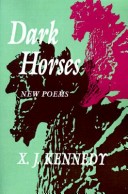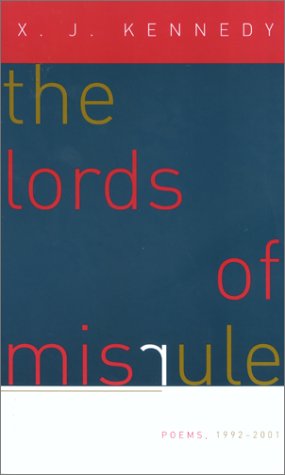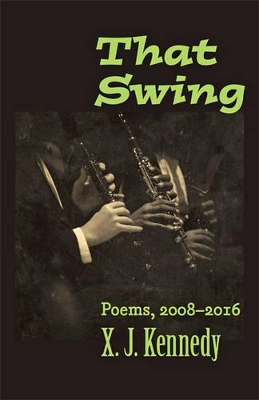Johns Hopkins: Poetry and Fiction
4 total works
In "Dark Horses" prize-winning poet X.J. Kennedy gathers 42 new poems. From the lighthearted ballad "Dancing with the Poets at Piggy's" to the darkly meditative lyric "The Waterbury Cross", the poems show Kennedy's wide range. There are intimate portraits of a woman veterinarian and a young man dying of AIDS, a song about the Sri Lankan festival of Buddha's tooth, and a stark account of a confrontation with a homeless panhandler. "Emily Dickinson Leaves a Message to the World" on the newly installed answering machine in her Amherst homestead. Finding a "Woodpile Skull" - the severed head of a black ant makes the poet laugh at his own expense as he plays "ham Hamlet to a formic Yorick". X.J. Kennedy's first collection, "Nude Descending a Staircase" (1961) won the Lamont Award of the Academy of American Poets. His most recent collection, "Cross Ties: Selected Poems" (1985) received the "Los Angeles Times" Book Award for poetry.
The Lords of Misrule, X. J. Kennedy's seventh volume of poetry, exhibits his characteristic blend of wit, intellectual curiosity, and formal mastery. The sixty poems collected here explore a wide range of subjects: a scathing curse on a sneak-thief, a wry ballad of Henry James and his not-quite lover Constance Fenimore Woolson, an elegy for Allen Ginsberg, incisive views of contemporary Egypt, a serio-comic meditation on the relic of St. Teresa of Avila which Spain's General Franco kept at his bedside, and a response to the events of September 11. Like the controlled frenzy of medieval Christmas festivities presided over by the appointed Lords of Misrule, Kennedy's poems possess a chaotic humor and frenetic energy held within tight metrical bounds. In his latest collection, Kennedy confirms his reputation as one of America's most accomplished and engaging poets.
For more than half a century, readers and listeners have taken special pleasure in the poetry of X. J. Kennedy. "In a Prominent Bar in Secaucus" is an ample gathering of his best work: memorable songs, startling lyrics, poems that tell poignant stories, character studies that vie with those of Edwin Arlington Robinson. A master of verbal music, Kennedy has long been praised for his wit and humor; as this collection reveals, many of his poems also reach surprising depths and heights. Donald Hall comments, "many of Kennedy's poems are wit itself. His wit is his way of understanding. No one else writing is capable of the effects in which Kennedy specializes." This book skims the cream from several slim volumes and six past collections including the prize-winning "Nude Descending a Staircase", "Cross Ties", and "The Lords of Misrule". It restores to print over fifty poems unavailable for decades and adds more than two dozen new poems collected for the first time. Kennedy has long occupied a unique place in American poetry; "In a Prominent Bar in Secaucus" now offers the first comprehensive collection to span his entire career.
In this, his ninth book of poetry, lyric master X. J. Kennedy regales his readers with engaging rhythm fittingly signaled by the book's title, which echoes Duke Ellington's jazz classic "It Don't Mean a Thing (If It Ain't Got That Swing)." Kennedy's poems, infused with verve and surprise, are by turns irresistibly funny and sharply insightful about life in America. Some poems are personal recollections of childhood and growing up, as in "My Mother Consigns to the Flames My Trove of Comic Books." "Thomas Hardy's Obsequies" tells the bizarre true account of the literary giant's burial. Other poems portray memorable characters, from Jane Austen ("Jane Austen Drives to Alton in Her Donkey Trap") to a giant land tortoise ("Lonesome George") to a slow-witted man hired to cook for a nudist colony ("Pudge Wescott"). Kennedy is a storyteller of the first order, relating tales of travel to far-reaching places, from the Galapagos Islands and Tiananmen Square to the hectic back streets of Bamako, Mali. This wise and clever book is rounded out with adept translations of work by Charles Baudelaire, Stephane Mallarme, Arthur Rimbaud, and others.



